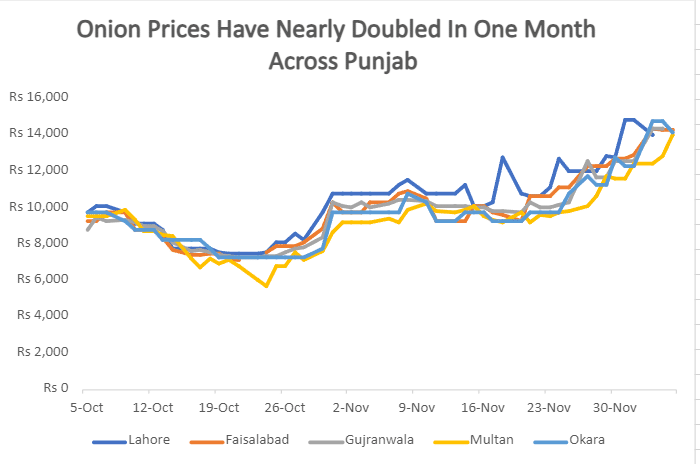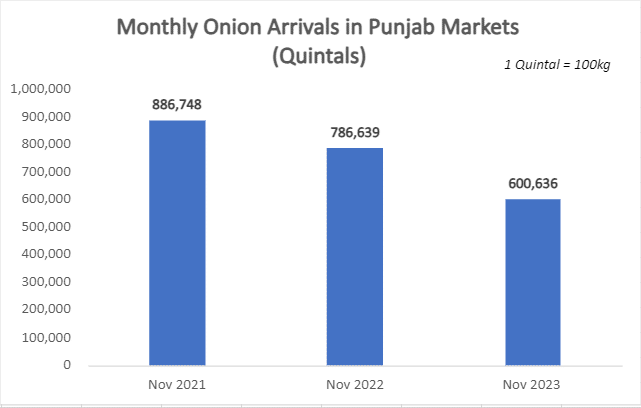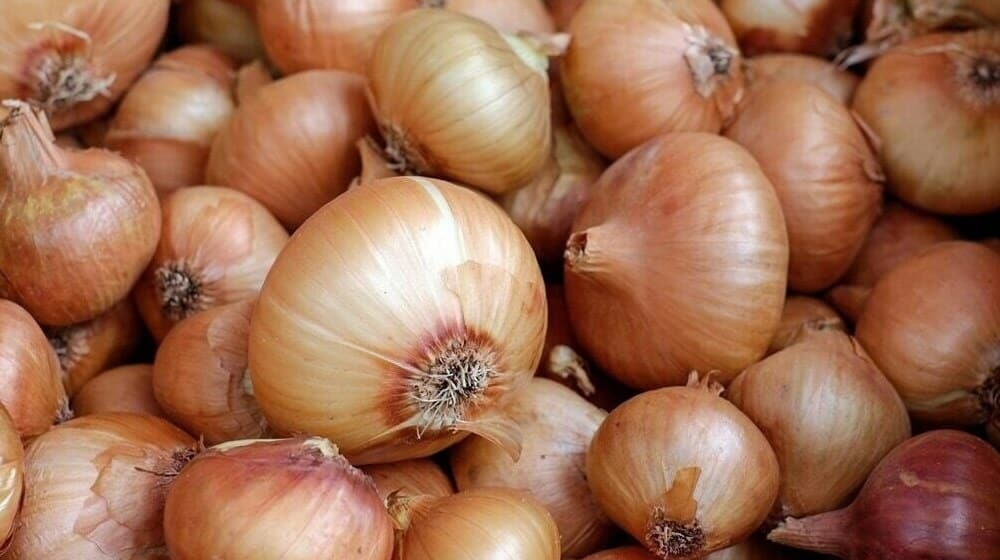Onion is just not an important vegetable for daily use, it has also become a critical export for Pakistan in recent years.
But wholesale onion prices have more than doubled across Punjab in one month and in retail, prices have jumped from Rs. 132-140 to Rs. 152-160 per kg in just last week in Lahore. Prices across Lahore, Multan, Okara, Gujranwala and Rawalpindi have risen by 87 to 103 percent in the last month.

“Average prices increased to nearly Rs. 14,100 per 100 kg by Dec 06, compared to Rs. 6,800 per 100 kg around a month ago. Multiple factors including lower supplies and robots export demand have contributed to this” stated a market consultant while talking to ProPakistani.
He added that in addition to India imposing a 40 percent export duty in August, which shrunk supplies globally and raised the demand for Pakistani produce, strict border restrictions are also curbing informal shipments from Iran and Afghanistan which are also raising prices.
India is the biggest exporter of the bulb in the world, but amid domestic price hikes due to shortages, late monsoon and other factors, it slammed a 40 percent export duty, though it does not seem to have much of an effect on markets in our neighborhood.
Pakistan exported nearly $145 million worth of Onions in 2021 mainly to Malaysia, Sri Lanka, United Arab Emirates, Qatar and Oman, as per data reported by the International Trade Center but exports dropped after that due to devastating floods.
Farmers talking to ProPakistani also confirmed the outbreak of specific diseases in major production regions in Sindh and Punjab during the past two years that might have contributed to the shrinkage of supplies.

Onion arrivals in Punjab’s vegetable markets during November 2023 are down 23 percent compared to the same month during flood-hit 2022 and 32 percent against November 2021. The shortage in arrivals can be due to either lower cultivation or losses due to disease or both.
It should be noted Sindh and not Punjab has the largest share (40 percent) in total onion production of two million tons in the country, followed by 33 percent from Balochistan, 16 percent from Punjab and 11 percent from KP.
This onion arrives in Punjab mainly from Hyderabad, Sukkur, Badin, Mirpur Khas and Dadu in Sindh and Quetta, Haala, Shadadpur and Zhob in Balochistan.
The disease is said to be possibly soil-born, either fungal or bacterial, with farmers citing yellowing, and wilting of plants as fungus cuts down the roots and even cause the bulbs to rot underground.
“The biggest issue we faced was the lack of expertise to handle the problem of fungus and soil management for hard soil, and whatever advisories we received also backfired on us,” stated Nabeel Yusuf, progressive farmer and agritech founder while talking to ProPakistani.
There is a huge knowledge gap regarding proper agriculture practices in Pakistan, but it extends deeper as we venture into vegetable and fruit farming which requires far more care than conventional crops.
“Sindh is a major producer of onions and we often have surplus enough that even exports fail to recoup the prices. Sindh’s this year onion cultivation was less than last year, but farmers have also suffered an outbreak of a certain disease, inflicting huge losses,” commended Mahmood Nawaz Shah, President of Sindh Abadgar Board (SAB) while talking to ProPakistani.
He has personally cultivated onions for the past 25 years but this year, he added that even the ‘lucky’ surviving fields only reported 20-30 percent of the yields and the worst of all, it was not diagnosed properly despite research institutes sampling the soil and farmers complaining to the Provincial Secretary of Agriculture.
Shah also advocated for a proper diagnostic infrastructure in the province to discover what happened to these plants, rather than only telling farmers what they should do once it has spread adding that only when we ascertain what it is, we can decide whether or not we should cultivate it next year.























Repeatation of crop in the same field makes the disease resistant to the pesticides. Crop rotation can be helpful